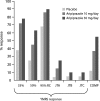Clinical significance of treatment effects with aripiprazole versus placebo in a study of manic or mixed episodes associated with pediatric bipolar I disorder
- PMID: 23480324
- PMCID: PMC3696952
- DOI: 10.1089/cap.2012.0024
Clinical significance of treatment effects with aripiprazole versus placebo in a study of manic or mixed episodes associated with pediatric bipolar I disorder
Abstract
Objective: Published studies in adult and pediatric bipolar disorder have used different definitions of treatment response. This analysis aimed to compare different definitions of response in a large sample of children and adolescents.
Methods: Anexploratory analysis of a 4-week, multicenter, placebo-controlled study assessed patients (n=296; ages, 10-17 years) with an acute manic/mixed episode associated with BIPOLAR I disorder who were randomized to aripiprazole (10 or 30 mg/day) or placebo. The primary efficacy endpoint was mean change from baseline to week 4 in young mania rating scale (YMRS) total score. Additional assessments included: clinical global impressions-bipolar disorder (CGI-BP) Overall and mania scales, child global assessment scale (CGAS), and parent and subject general behavior inventory. Response was compared across seven operational definitions. Cohen's κ and Spearman's correlation tested relationships between various response definitions or changes in outcome measures and clinically meaningful improvement (defined as a CGI-BP overall improvement score of 1 or 2).
Results: Response rates varied depending upon the operational definition, but were highest for 95% reliable change (statistical method used to determine individual change from previous assessment) and ≥33% reduction in YMRS total score. Response rate definitions with the highest validity in terms of predicting clinically meaningful improvement were: ≥50% reduction on YMRS (κ=0.64), a composite definition of response (YMRS <12.5, children's depression rating scale-revised (CDRS-R) ≤40, and CGAS ≥51; κ=0.59), and 95% reliable change on the CGAS or 33% reduction on YMRS (κ=0.56). Parent ratings of symptoms were generally better at detecting symptom improvement than were subject ratings (κ=∼0.4-0.5 vs. ∼0.2 when compared with CGI-BP overall improvement score).
Conclusions: Clinically meaningful definitions of response in acute treatment of a manic/mixed episode in pediatric subjects include a 50% change in YMRS and a composite measure of response. Parent-reported measures of symptom improvement appear reliable for assessing symptom change.
Trial registration: ClinicalTrials.gov NCT00110461.
Figures



Similar articles
-
Respondent and item level patterns of response of aripiprazole in the acute treatment of pediatric bipolar I disorder.J Affect Disord. 2012 Dec 20;143(1-3):231-5. doi: 10.1016/j.jad.2012.04.033. Epub 2012 Oct 6. J Affect Disord. 2012. PMID: 23044285 Clinical Trial.
-
Acute treatment of pediatric bipolar I disorder, manic or mixed episode, with aripiprazole: a randomized, double-blind, placebo-controlled study.J Clin Psychiatry. 2009 Oct;70(10):1441-51. doi: 10.4088/JCP.09m05164yel. J Clin Psychiatry. 2009. PMID: 19906348 Clinical Trial.
-
Aripiprazole for the treatment of pediatric bipolar I disorder: a 30-week, randomized, placebo-controlled study.Bipolar Disord. 2013 Mar;15(2):138-49. doi: 10.1111/bdi.12042. Bipolar Disord. 2013. PMID: 23437959 Clinical Trial.
-
Age-grouped differences in bipolar mania.Compr Psychiatry. 2012 Nov;53(8):1110-7. doi: 10.1016/j.comppsych.2012.04.011. Epub 2012 Jun 6. Compr Psychiatry. 2012. PMID: 22682679 Review.
-
Asenapine: a review of its use in the management of mania in adults with bipolar I disorder.CNS Drugs. 2011 Mar;25(3):251-67. doi: 10.2165/11206700-000000000-00000. CNS Drugs. 2011. PMID: 21323396 Review.
Cited by
-
Future directions for research on youth with bipolar spectrum disorders.J Clin Child Adolesc Psychol. 2013;42(5):734-47. doi: 10.1080/15374416.2013.817312. Epub 2013 Aug 5. J Clin Child Adolesc Psychol. 2013. PMID: 23915232 Free PMC article.
-
Aripiprazole alone or in combination for acute mania.Cochrane Database Syst Rev. 2013 Dec 17;2013(12):CD005000. doi: 10.1002/14651858.CD005000.pub2. Cochrane Database Syst Rev. 2013. PMID: 24346956 Free PMC article.
-
Profile of aripiprazole in the treatment of bipolar disorder in children and adolescents.Adolesc Health Med Ther. 2014 Nov 27;5:211-21. doi: 10.2147/AHMT.S50015. eCollection 2014. Adolesc Health Med Ther. 2014. PMID: 25473324 Free PMC article. Review.
-
Structural invariance of General Behavior Inventory (GBI) scores in Black and White young adults.Psychol Assess. 2015 Mar;27(1):21-30. doi: 10.1037/pas0000020. Epub 2014 Sep 15. Psychol Assess. 2015. PMID: 25222430 Free PMC article.
-
The International Society for Bipolar Disorders Task Force report on pediatric bipolar disorder: Knowledge to date and directions for future research.Bipolar Disord. 2017 Nov;19(7):524-543. doi: 10.1111/bdi.12556. Epub 2017 Sep 25. Bipolar Disord. 2017. PMID: 28944987 Free PMC article. Review.
References
-
- Achenbach TM. McConaughy SH. Howell CT. Child/adolescent behavioral and emotional problems: Implication of cross-informant correlations for situational specificity. Psychol Bull. 1987;101:213–232. - PubMed
-
- American Psychiatric Association. Diagnostic and Statistical Manual of Mental Disorders. 4th. Washington, DC: American Psychiatric Association; 1994. (DSM-IV)
-
- Ankuta GY. Abeles N. Client satisfaction, clinical significance, and meaningful change in psychotherapy. Prof Psychol Res Pract. 1993;24:70–74.
-
- Atkins DC. Bedics JD. McGlinchey JB. Beauchaine TP. Assessing clinical significance: Does it matter which method we use? J Consult Clin Psychol. 2005;73:982–989. - PubMed
-
- Camara W. Nathan J. Puente A. Psychological test usage in professional psychology: Report of the APA practice and science directorates. Washington, DC: American Pyschological Association Press; 1998.
Publication types
MeSH terms
Substances
Associated data
LinkOut - more resources
Full Text Sources
Other Literature Sources
Medical
